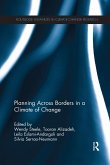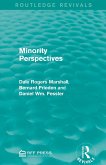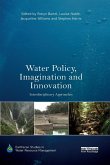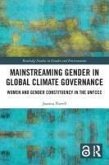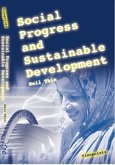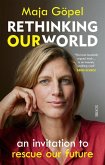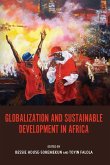Sustainable Development Goal 16 and the Global Governance of Violence
Critical Reflections on the Uncertain Future of Peace
Herausgeber: Donais, Timothy; Houten, Kirsten van; Edgar, Alistair D
Sustainable Development Goal 16 and the Global Governance of Violence
Critical Reflections on the Uncertain Future of Peace
Herausgeber: Donais, Timothy; Houten, Kirsten van; Edgar, Alistair D
- Broschiertes Buch
- Merkliste
- Auf die Merkliste
- Bewerten Bewerten
- Teilen
- Produkt teilen
- Produkterinnerung
- Produkterinnerung
This book brings together a diverse range of scholars and practitioners working at the nexus of peace and development to reflect what impact Goal 16 of the Sustainable Development Goals has made, or may yet make, towards reducing violence in 'all its forms'.
Andere Kunden interessierten sich auch für
![Planning Across Borders in a Climate of Change Planning Across Borders in a Climate of Change]() Planning Across Borders in a Climate of Change65,99 €
Planning Across Borders in a Climate of Change65,99 €![Minority Perspectives Minority Perspectives]() Dale Rogers MarshallMinority Perspectives50,99 €
Dale Rogers MarshallMinority Perspectives50,99 €![Water Policy, Imagination and Innovation Water Policy, Imagination and Innovation]() Water Policy, Imagination and Innovation62,99 €
Water Policy, Imagination and Innovation62,99 €![Mainstreaming Gender in Global Climate Governance Mainstreaming Gender in Global Climate Governance]() Joanna FlavellMainstreaming Gender in Global Climate Governance61,99 €
Joanna FlavellMainstreaming Gender in Global Climate Governance61,99 €![Social Progress and Sustainable Development Social Progress and Sustainable Development]() Neil ThinSocial Progress and Sustainable Development31,99 €
Neil ThinSocial Progress and Sustainable Development31,99 €![Rethinking Our World Rethinking Our World]() Maja GöpelRethinking Our World16,99 €
Maja GöpelRethinking Our World16,99 €![Globalization and Sustainable Development in Africa Globalization and Sustainable Development in Africa]() Globalization and Sustainable Development in Africa58,99 €
Globalization and Sustainable Development in Africa58,99 €-
-
-
This book brings together a diverse range of scholars and practitioners working at the nexus of peace and development to reflect what impact Goal 16 of the Sustainable Development Goals has made, or may yet make, towards reducing violence in 'all its forms'.
Hinweis: Dieser Artikel kann nur an eine deutsche Lieferadresse ausgeliefert werden.
Hinweis: Dieser Artikel kann nur an eine deutsche Lieferadresse ausgeliefert werden.
Produktdetails
- Produktdetails
- Verlag: Taylor & Francis
- Seitenzahl: 256
- Erscheinungstermin: 18. Dezember 2024
- Englisch
- Abmessung: 231mm x 152mm x 17mm
- Gewicht: 422g
- ISBN-13: 9781032270586
- ISBN-10: 1032270586
- Artikelnr.: 72108494
- Herstellerkennzeichnung
- Libri GmbH
- Europaallee 1
- 36244 Bad Hersfeld
- gpsr@libri.de
- Verlag: Taylor & Francis
- Seitenzahl: 256
- Erscheinungstermin: 18. Dezember 2024
- Englisch
- Abmessung: 231mm x 152mm x 17mm
- Gewicht: 422g
- ISBN-13: 9781032270586
- ISBN-10: 1032270586
- Artikelnr.: 72108494
- Herstellerkennzeichnung
- Libri GmbH
- Europaallee 1
- 36244 Bad Hersfeld
- gpsr@libri.de
Timothy Donais is an associate professor in the Department of Global Studies at Wilfrid Laurier University, where he teaches in the area of peace and conflict studies. He has also served as Director of the Masters in International Public Policy program, and Co-Director of the Ph.D. program in Global Governance, both at the Balsillie School of International Affairs. His research interests are focused on peacebuilding, protection of civilians, and security sector reform. Tim is the author of Peacebuilding and Local Ownership: Post-conflict Consensus Building (Routledge, 2012) and The Political Economy of Peacebuilding in Post-Dayton Bosnia (Routledge, 2005). Alistair D. Edgar is an associate professor in the Department of Political Science at Wilfrid Laurier University and is cross-appointed to the Balsillie School of International Affairs. He teaches in the area of international relations and global governance. Recent publications include "The Changing Role of the United Nations in Managing Armed Conflict," in Fen Osler Hampson, Alpaslan Ozerdem and Jonathan Kent (eds.), Routledge Handbook of Peace, Security and Development (Routledge, 2020). He is co-editor of Global Governance: A Review of Multilateralism and International Organizations. Kirsten Van Houten is a Postdoctoral Fellow in Human Rights at the University of Winnipeg and Manitoba Association of Rights and Liberties. She has worked as an academic and practitioner at the Human Rights and Peacebuilding Nexus, since completing her Ph.D. in International Development Studies at the University of Ottawa. She has worked with Canadian political parties and Non-Governmental Organizations to advocate for improved policy on peacebuilding. Her research interests include peacebuilding, civil society, human rights, state fragility, Canadian foreign policy, and gender equality. Regionally her work has focussed on Sub-Saharan Africa and Southeast Asia.
1. Peaceful, Just, Inclusive? Unpacking the SDG 16 Agenda Part I: The
Universal Aspirations of Goal 16 2. Getting Peace and Security on the
Development Agenda: The Evolution of a Contested Goal 3. Human Security and
the SDGs: Rebalancing Security Discourse in a Pandemic World 4.
Strengthening the Rule of Law, Fighting Corruption 5. Access to Justice,
the Rule of Law and SDG 16: From Normative Struggle to Evolution Part II:
Power and Participation 6. Disabled Persons Organisations' Advocacy for SDG
16+: Levers for Change and/or Drops in a Neo-Liberal Bucket? 7. Gendered
War, Gendered Peace: How the Women, Peace and Security Agenda Contributes
to SDG 16 8. Women and Peacebuilding in South Sudan: The Paradox of Gender
Inclusion 9. Toward 2030: Synergies with SDG 16 and the Youth, Peace and
Security Agenda 10. Recognition and Protection of Indigenous Peoples'
Rights: A Prerequisite for Advancing Peace and Security Part III:
Transitions from Conflict and the Politics of Inclusivity 11. Exiting the
Fragility Trap: SDG 16 is the Key but Attaining it Remains Elusive 12.
Unpacking the Politics of Inclusion in Conflict-Affected Contexts 13.
Trapped between Corruption and Cruelty: Inclusivity and Fragility in the
MENA Region 14. Local Peace Councils and the Politics of Inclusivity in
Ghana 15. Conclusion: Goal 16 and the Uncertain Future of Peace
Universal Aspirations of Goal 16 2. Getting Peace and Security on the
Development Agenda: The Evolution of a Contested Goal 3. Human Security and
the SDGs: Rebalancing Security Discourse in a Pandemic World 4.
Strengthening the Rule of Law, Fighting Corruption 5. Access to Justice,
the Rule of Law and SDG 16: From Normative Struggle to Evolution Part II:
Power and Participation 6. Disabled Persons Organisations' Advocacy for SDG
16+: Levers for Change and/or Drops in a Neo-Liberal Bucket? 7. Gendered
War, Gendered Peace: How the Women, Peace and Security Agenda Contributes
to SDG 16 8. Women and Peacebuilding in South Sudan: The Paradox of Gender
Inclusion 9. Toward 2030: Synergies with SDG 16 and the Youth, Peace and
Security Agenda 10. Recognition and Protection of Indigenous Peoples'
Rights: A Prerequisite for Advancing Peace and Security Part III:
Transitions from Conflict and the Politics of Inclusivity 11. Exiting the
Fragility Trap: SDG 16 is the Key but Attaining it Remains Elusive 12.
Unpacking the Politics of Inclusion in Conflict-Affected Contexts 13.
Trapped between Corruption and Cruelty: Inclusivity and Fragility in the
MENA Region 14. Local Peace Councils and the Politics of Inclusivity in
Ghana 15. Conclusion: Goal 16 and the Uncertain Future of Peace
1. Peaceful, Just, Inclusive? Unpacking the SDG 16 Agenda Part I: The
Universal Aspirations of Goal 16 2. Getting Peace and Security on the
Development Agenda: The Evolution of a Contested Goal 3. Human Security and
the SDGs: Rebalancing Security Discourse in a Pandemic World 4.
Strengthening the Rule of Law, Fighting Corruption 5. Access to Justice,
the Rule of Law and SDG 16: From Normative Struggle to Evolution Part II:
Power and Participation 6. Disabled Persons Organisations' Advocacy for SDG
16+: Levers for Change and/or Drops in a Neo-Liberal Bucket? 7. Gendered
War, Gendered Peace: How the Women, Peace and Security Agenda Contributes
to SDG 16 8. Women and Peacebuilding in South Sudan: The Paradox of Gender
Inclusion 9. Toward 2030: Synergies with SDG 16 and the Youth, Peace and
Security Agenda 10. Recognition and Protection of Indigenous Peoples'
Rights: A Prerequisite for Advancing Peace and Security Part III:
Transitions from Conflict and the Politics of Inclusivity 11. Exiting the
Fragility Trap: SDG 16 is the Key but Attaining it Remains Elusive 12.
Unpacking the Politics of Inclusion in Conflict-Affected Contexts 13.
Trapped between Corruption and Cruelty: Inclusivity and Fragility in the
MENA Region 14. Local Peace Councils and the Politics of Inclusivity in
Ghana 15. Conclusion: Goal 16 and the Uncertain Future of Peace
Universal Aspirations of Goal 16 2. Getting Peace and Security on the
Development Agenda: The Evolution of a Contested Goal 3. Human Security and
the SDGs: Rebalancing Security Discourse in a Pandemic World 4.
Strengthening the Rule of Law, Fighting Corruption 5. Access to Justice,
the Rule of Law and SDG 16: From Normative Struggle to Evolution Part II:
Power and Participation 6. Disabled Persons Organisations' Advocacy for SDG
16+: Levers for Change and/or Drops in a Neo-Liberal Bucket? 7. Gendered
War, Gendered Peace: How the Women, Peace and Security Agenda Contributes
to SDG 16 8. Women and Peacebuilding in South Sudan: The Paradox of Gender
Inclusion 9. Toward 2030: Synergies with SDG 16 and the Youth, Peace and
Security Agenda 10. Recognition and Protection of Indigenous Peoples'
Rights: A Prerequisite for Advancing Peace and Security Part III:
Transitions from Conflict and the Politics of Inclusivity 11. Exiting the
Fragility Trap: SDG 16 is the Key but Attaining it Remains Elusive 12.
Unpacking the Politics of Inclusion in Conflict-Affected Contexts 13.
Trapped between Corruption and Cruelty: Inclusivity and Fragility in the
MENA Region 14. Local Peace Councils and the Politics of Inclusivity in
Ghana 15. Conclusion: Goal 16 and the Uncertain Future of Peace


